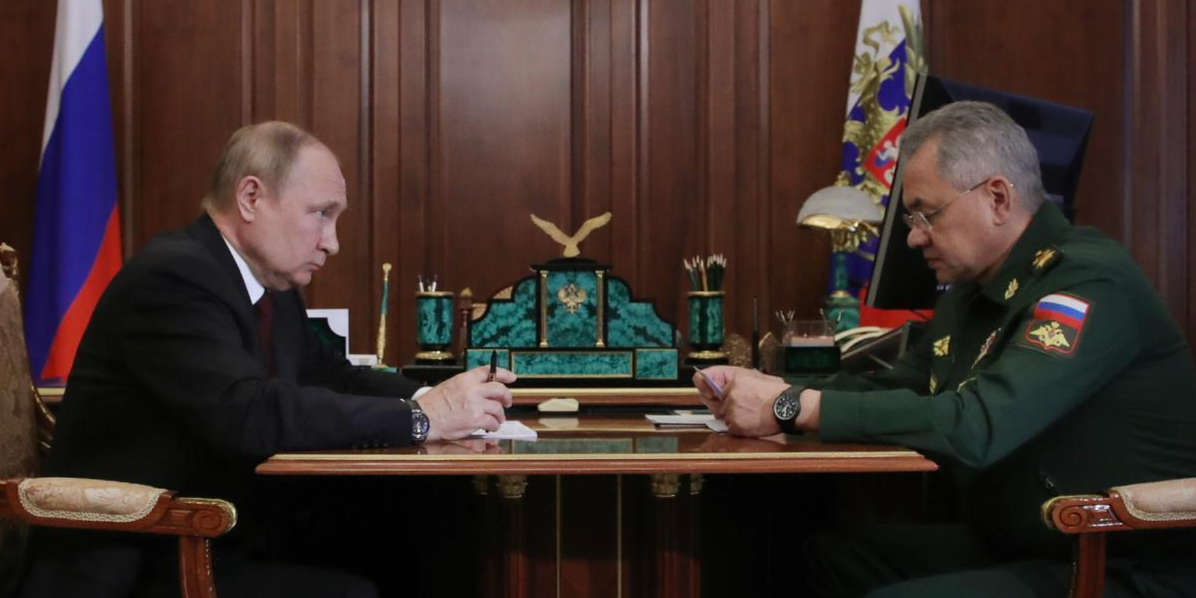In the picture
Vladimir Putin and Defense Minister Sergey Shoigu [Kremlin].
To those who accuse him of invoking the nuclear threat, Vladimir Putin responded in his speech on foreign policy last November 2 that when he mentions a "nuclear attack" he is merely echoing threats previously issued by his Western counterparts, adding that such a war would make "no political, no military sense." However, the Russian president continues to escalate Moscow's accusations, holding Ukraine and its allies responsible for preparing weapons, attacks and threats intended to break the integrity and essence of Russia. In fact, since the beginning of the Russian invasion of Ukraine on February 24, 2022, the Kremlin has falsely pointed the finger at the West several times for this subject of situations, setting off alarms, especially among NATO members, who understand that the uncertainty of the 'false flag' strategy Putin seems to be shuffling may be the trigger for the dreaded nuclear war.
'False flag' operations, from agreement with Scott Radnitz, professor of programs of study Russian and Eurasian at the University of Washington, are "attacks by a government against its own forces to create the appearance of hostile action by an adversary." The first of these occurred last October 24, when tensions caused by Russia's attempt to halt Ukraine's advance in southern Ukraine were at their hottest. It was then that Russian Defense Minister Sergey Shoigu blamed Ukraine for planning a 'dirty bomb' attack and then blamed the Kremlin. This subject weapon uses explosives to spread radioactive waste and, although it does not have the devastating effect of a nuclear explosion, it could contaminate the immediate surroundings of the blast zone.
The truth is that, even without presenting any evidence subject , Shoigu made these accusations to his counterparts in the United States, France, the United Kingdom and Turkey by telephone. They immediately rejected them, claiming that it was a Putin plan to justify an escalation of the conflict. In this regard, Adrienne Watson, the spokeswoman for the White House National Security committee , stressed that, "the world would view any attempt to use this allegation as a pretext for escalation." The uncertainty surrounding the Russian action is growing, and the world can only wonder, is Putin seeking an escalation of tensions to demonstrate the power that has come to be so much in question even in his own country?
The United Nations, together with the experts of the International Atomic Energy Agency (IAEA), reported last November 3 that, after a research in different parts of Ukraine, such as Kiev, Zhovti and Dnipro, no test had been found linking Ukraine to an alleged attempt to manufacture a 'dirty' atomic bomb. In the words of IAEA's director general, Rafael Mariano Grossi, "our assessment technical and scientific of the results we have so far showed no sign of undeclared nuclear activities and materials at these three locations."
Sudden statements, surprise game changers and the lack of a system of filters regarding the decisions made by the highest Russian leader make the folder that reads "nuclear attack" not to be taken off any table. The president of Russia determines the basic direction of Russia's foreign and domestic policy and represents the Russian state within the country and in foreign affairs. It is true, however, that even if Putin were in charge of making the decision to use the nuclear weapon, the cooperation of his army would also be necessary to make the launch effective.
It should be recalled that this subject of 'false flag' operations are nothing new for Putin. Already in 1999, he blamed Chechen "terrorists" for the deadly Moscow apartment bombings which, according to well-founded suspicions, were allegedly organized by the Russian secret police. Moreover, despite the Kremlin's denial, the use of chemical gases in the war in Syria and the poisoning of opponents of the Russian regime by means of Novichok nerve agents have been confirmed.
It would not be unreasonable, then, to think that the 'false flag' operations are the perfect tool Putin needs to fulfill two primary objectives: the first, to demonstrate once again that he is pulling the strings in his country and that he can exert a relevant influence on the future of Europe; the second, to find the limits of the West's retaliation to Russia's incessant attacks and threats.
Russia's constant search for an escalation of tensions is the perfect disguise for Putin, and to hide his need to find a perfect target to aim at and make doubts about his strategy of "liberating" the Ukrainian people from an oppressive regime disappear. The Russian president urgently needs a victory, but the mutual destruction guaranteed by the use of the nuclear weapon is somewhat improbable. However, the West cannot simply rely on the common sense of the Russian leader.

